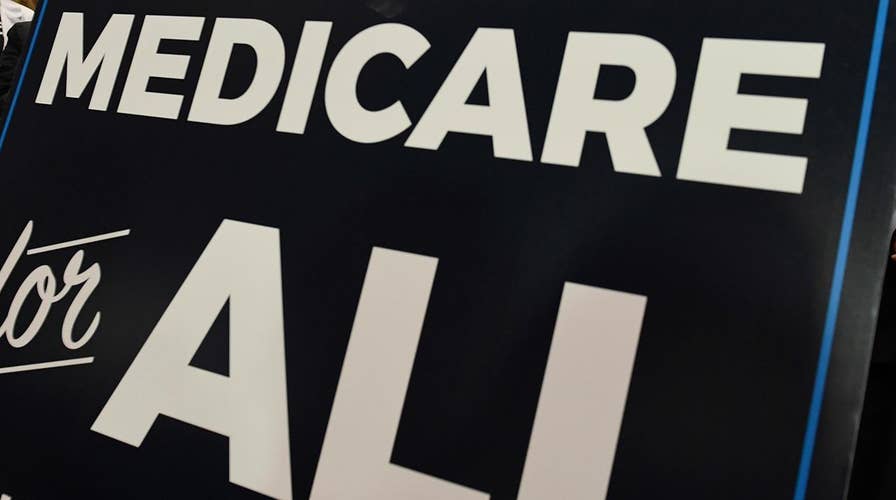What is the true cost of Medicare for all?
Juniper Research Group founder and CEO Chris Jacobs breaks down the cost.
Former Vice President Joe Biden has reiterated his opposition to any health reform plan that would scrap ObamaCare, including "Medicare-for-all." According to the former vice president, "starting over" on health care would be "a sin."
Instead, Biden proposed expanding ObamaCare to include a "public option," wherein individuals could buy a government-sponsored health plan. Moderate Democrats have seized on the public option as a less disruptive brand of health care reform than Medicare-for-all.
But there's nothing moderate about a public option. It may take some time, but Biden's preferred plan would ultimately lead to a government takeover of health insurance.
JOE BIDEN TAKES INDIRECT SHOT AT KAMALA HARRIS OER HER SUPPORT FOR MEDICARE FOR ALL
Democrats have floated plenty of public option plans; each works in essentially the same way. The government would launch a health plan with the express intent of under-pricing private health insurers. Some public option plans would allow anyone to buy into the new government offering, or into Medicare or Medicaid. Others would limit eligibility to those over the age of 50. Still others would permit people to opt out of their employer-sponsored coverage in favor of the public option.
Because the public option will be less expensive than private plans, they'll almost certainly prove popular. One study found that a national public option would enroll more than 40 million Americans in its first year alone.
But the public option can only charge less than private plans because it has the ability to dictate the prices it will pay doctors and hospitals. In most cases, public option proponents envision reimbursing health care providers at or around the level Medicare does.
And that means underpaying them. On average, hospitals receive just 87 cents for each dollar they spend treating Medicare beneficiaries each year. All told, Medicare underpaid hospitals by nearly $54 billion in 2017.
Hospitals charge private insurers more to make up the difference. But if enough people were to switch from private coverage to the public option, that pricing strategy would fall apart.
Hospitals' losses could be catastrophic. According to one analysis, a public option would cause hospitals to lose $774 billion in a decade.
In the short-term, hospitals could try to limit the number of patients with public insurance they'd be willing to see. Something similar is already happening in many major metropolitan areas, where around half of family medicine doctors won't accept new Medicaid patients.
But the public option's political advocates are unlikely to stand for that. In fact, most public option proposals explicitly require health care providers who participate in the existing Medicare program to accept beneficiaries of the new government plan.
That would leave hospitals and doctors to try to squeeze the privately insured even more. Insurers would pass those rate hikes along in the form of higher premiums. Higher premiums would drive an even greater number of people to switch to the public option. And the cycle would repeat.
Eventually, private plans would leave the market, unable to attract enough customers to stay in business. The public option would become the only option.
CLICK HERE TO GET THE FOX NEWS APP
If the individual insurance market succumbs to a government takeover, then the federal government would be the insurer for half the population. Employers might find it appealing -- and cost-effective -- to end their benefits programs and turn their workers over to the public option. In fact, some of the Democrats' public option proposals envision facilitating that process.
In other words, like Medicare-for-all, a public option would deliver single-payer health care, just a bit more slowly. A government takeover of the nation's health insurance system — that's the real "sin."









































